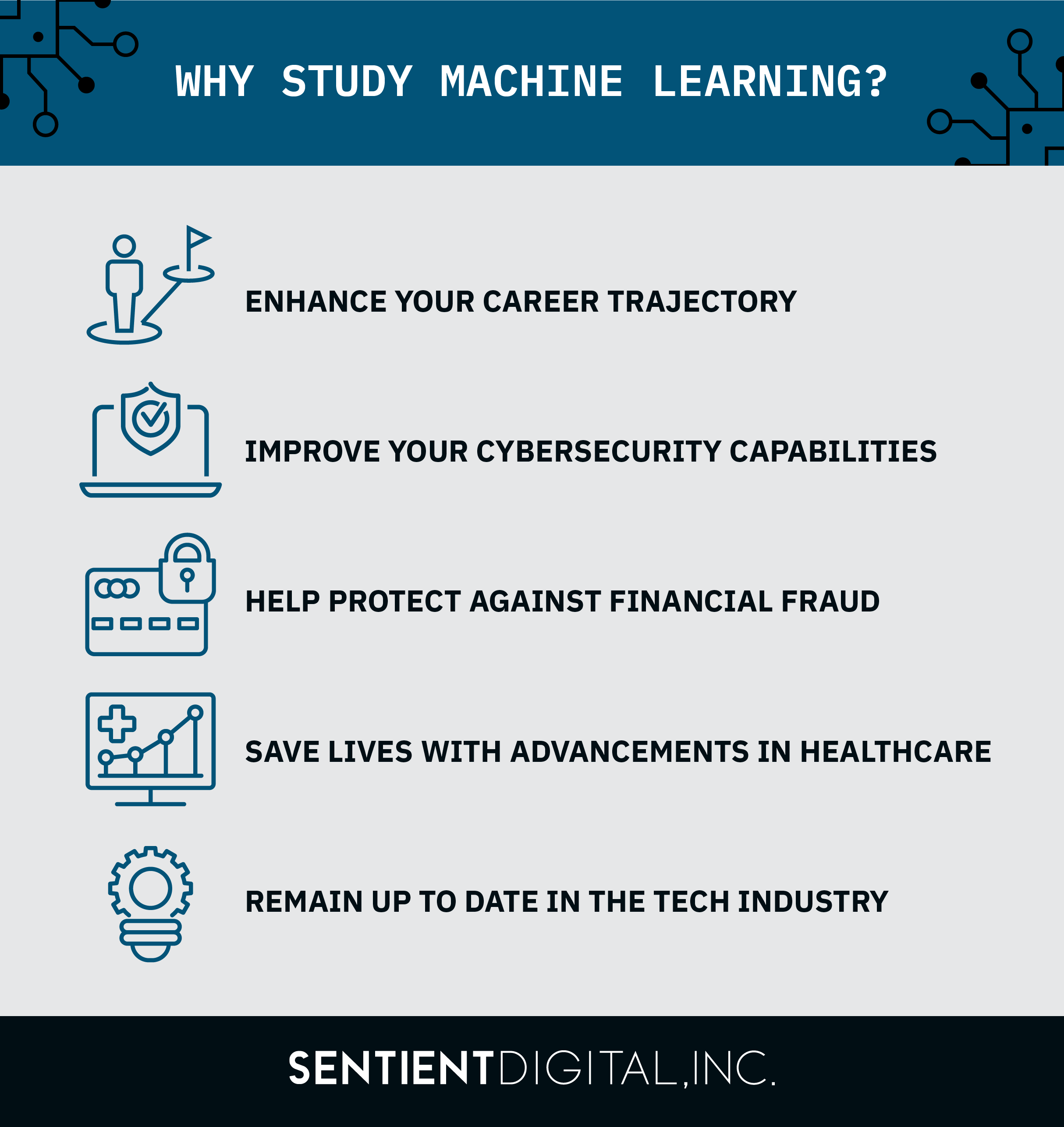The many advantages of learning machine learning can launch your career into the future. The capabilities of the IT industry have advanced by leaps and bounds in recent years thanks to machine learning, making it a lucrative field to pursue.
In the not so distant past, machine learning was largely inaccessible to all but the most technically skilled. Now, however, the impact of machine learning is seen far and wide, with many people using it in their daily lives without even realizing it.
As machine learning technology grows in use and popularity, Sentient Digital, like many other companies, is seeking out professionals with machine learning experience. So whether you are a student deciding on a field of study or an IT professional seeking to expand your marketability, check out our thoughts on how you can gain the advantages of learning machine learning.
What Is Machine Learning?
Machine learning is an area of artificial intelligence in which data and algorithms are used to create human-like processing in a computer. Machine learning continues to grow in popularity because of the many benefits it presents to businesses. AI in general and machine learning specifically allow for the optimization of a variety of business operations and can be advantageous in virtually any industry.
Machine learning can be seen in the recommendations our streaming services offer, the quick reply features in email and messaging platforms, advanced weather predictions, and more. Importantly, machine learning saves time and money by streamlining tasks and reducing the amount of direct human involvement needed to complete them. It also helps to cut down on the costs that repeated human error can cause. The technology is being used to improve customer service, too, as its capabilities enable businesses to offer unique customer experiences based on the personal needs of each individual.
5 Advantages of Learning Machine Learning
1. Learning Machine Learning Enhances Your Career Trajectory
The most obvious advantage of learning machine learning is being able to leverage that experience for new opportunities and career advancements. The demand for machine learning adept employees is on the rise. Businesses are actively seeking ways to implement AI and machine learning for their benefit, so a candidate with machine learning capabilities will have higher appeal.
By studying machine learning, you increase your chances of attracting the best employers too, as machine learning becomes a more heavily coveted skill. This means that you may become eligible for roles at companies with quality culture, interesting challenges, better benefits, and higher salary ranges.
The advantages of learning machine learning for those already employed in the IT field include adding a new tool to your problem-solving toolbox and distinguishing you from other professionals in your organization. Having an understanding of machine learning can help you take on projects that others are unable to handle and can help you move up in seniority or find a new role at another company.
2. Machine Learning Skills Can Improve Cybersecurity
Machine learning has the ability to enhance businesses’ approach to cybersecurity. The adaptive nature of machine learning means that it can grow to recognize familiar patterns that happen around cybersecurity breaches.
Cybersecurity methods bolstered by machine learning capabilities are improving in real time, remembering past threats and developing tactics to protect against them in the future. This creates room for cybersecurity providers to respond to real-time threats more easily and efficiently as background and routine processes are optimized.
Employing machine learning in cybersecurity allows companies to focus on and improve other areas of their business, as security handlings are streamlined and require less manpower over time. But to understand and continue to improve the AI and machine learning that strengthens cybersecurity, the industry needs professionals interested in studying machine learning.
Maintaining airtight cybersecurity is of major importance to any organization, making advancements in this area vital and allowing students and job seekers to be greatly advantaged by learning machine learning.
3. Knowledge of Machine Learning Helps Protect Against Financial Fraud
As AI and machine learning continue to advance and accessibility increases, these technologies are being applied in major industries globally, some of which millions of people rely upon. Major financial institutions are now turning to machine learning to help protect their customers from fraud and money laundering. Millions of people still fall victim to identity theft every year, but machine learning can help curb these crimes.
Financial industry giants such as PayPal are designing and employing algorithms powered by deep learning to sift through transactions and identify illegitimate ones—with higher accuracy and better speed than allowed for by previous methods. Over time, these advancements have the potential to save billions of dollars by undercutting the ease with which criminals can commit financially motivated crimes.
Developing machine learning skills can allow entry-level employees in the IT industry to get in on the ground floor of innovative projects like this. Even for those established in their careers, adding machine learning to their repertoire can help them to shape the future of this field and many others.
The security role of machine learning in the financial industry protects businesses and their stakeholders from a wide variety of data breaches. Even if you do not intend to work in the banking industry, a familiarity with the capabilities of machine learning to protect financial information can make you a valuable employee to any company.
4. By Learning Machine Learning, You Can Help Save Lives

Within the healthcare industry, machine learning is helping medical professionals improve and save patients’ lives. Using machine learning, for example, healthcare providers are able to improve patients’ access to electronic medical records through design improvements to the systems that house them.
Additionally, machine learning has enhanced diagnostic accuracy as well as the quality and availability of medical imaging. It is also being used to preempt the development of certain diseases through the identification and classification of recurring risk factors in currently ailing patients. More accurate and nuanced disease progression models are also being made possible thanks to machine learning.
In 2020, AI and machine learning were used to help fight COVID-19. With their ability to rapidly process and analyze huge amounts of data, these technologies offered unique opportunities to track, diagnose, and treat COVID-19 as more and more information about the virus became available. At SDi, our team researched avenues for using machine learning with a series of mathematical models based on studies of overlapping communities in complex networks to both track current cases of COVID-19 and predict where exactly the virus would spread.
Future efforts of AI implementation in the medical industry are geared towards the development and improvement of vital procedures as well. An advantage of learning machine learning now is that in doing so, you are empowering yourself to assist in the development of life-saving medical advancements that are on the horizon.
5. An Understanding of Machine Learning Is Essential to Remain Technologically Up to Date
Machine learning is only becoming more ingrained in the tech industry. If you are interested in the realm of software engineering, then learning machine learning can help you to stay up to date in your field. Jobs may prioritize applicants with machine learning experience, so having AI knowledge and experience can help put you at the front of the pack.
But the rise of machine learning is affecting jobs within the IT industry in a less obvious way as well. Some have speculated that the spread of technology such as no code AI and low code AI will lead to the extinction of technical engineering roles over time. More likely, however, is that these changes will cause an evolution in the role that tech service providers fill for their clients.
Because artificial intelligence is useful for business but is far from perfect, human engineers will always be necessary for maintenance and continued development of this technology. That means that over time, while technically oriented jobs in a given industry will still be available, their requirements may expand beyond that of workers who have not taken the time to learn machine learning. For those hoping to remain in the field for many years, learning machine learning is the best path forward to avoid getting weeded out.
The Present and Future of Machine Learning and AI
For tech professionals to stay competitive, it’s important to understand the current landscape of machine learning and artificial intelligence as well as where it’s headed. These technologies are quickly bringing innovations to an ever-increasing number of industries, and experts who know how to apply machine learning and AI to complex problems are in high demand.
Current Trends in Machine Learning and AI
Understanding how machine learning and AI are currently being used will ensure that tech professionals can equip themselves with the knowledge and skills necessary to fulfill today’s business needs.
- Natural Language Processing (NLP): Machine learning technologies that use natural language processing are evolving at a rapid rate to meet increasingly high demand from businesses and end users. There is a greater need than ever for machines to adequately understand human language, supporting more sophisticated and helpful chatbots, more accurate and complex language translation tools, and more advanced sentiment monitoring and analysis for everything from brands to politicians.
- AI and Internet of Things (IoT): Artificial intelligence is being used to support and enhance IoT, resulting in systems that are smarter, easier to use, and more efficient. AI algorithms can provide, among other things, more complex data analysis, autonomous decision making capabilities, and more accurate predictions to advance the uses of IoT devices.
- Ethics and Governance: As is usually the case, once new technologies start to establish themselves and begin entering the mainstream, our government organizations and legal systems must make efforts to adequately regulate them. Ethical issues related to bias and data privacy, for instance, are receiving greater and greater attention today. As such, both private and public organizations are likewise devoting more attention and placing greater value on artificial intelligence and machine learning systems that are made with these ethical considerations and compliance with government regulations in mind.
- Automated Machine Learning (AutoML): As demand increases for machine learning technologies to be usable by the general public, automated machine learning has been on the rise. This makes it easier to use machine learning by automating certain tasks, including the selection, composition, and parameterization of machine learning models. Not only does this make machine learning easier for users without a background in technology, but it also makes machine learning model creation more efficient overall.
Anticipated Trends in Machine Learning and AI
Technology evolves quickly, oftentimes faster than professionals can reactively upskill. To stay ahead of the curve, it is important to always be learning proactively and getting a head start on the future of machine learning before it arrives.
- Healthcare Applications: We are already seeing the significant potential of machine learning and artificial intelligence technologies in this critical sector. As these technologies advance and become more reliable, understood, and accepted, they will become widespread in healthcare. Machine learning and AI can predict disease outbreaks, aiding in preventative measures as well as resource mobilization to areas in need. They can also provide more personalized care, assist with surgeries, and improve the accuracy of diagnoses and treatment plans, all of which can improve patient outcomes and potentially reduce costs.
- Cybersecurity Applications: While artificial intelligence and machine learning already have a strong foothold in cybersecurity, the need for these technologies will only increase as cyberattacks become more sophisticated. Machine learning and AI will continually advance to support threat detection by analyzing data, identifying patterns, and flagging anomalies with greater speed and accuracy. Our reliance on these technologies to react to threats in a matter of seconds will likewise grow to keep pace with the advancement of cyber threats.
- Quantum Computing: There is great potential for quantum computing to contribute to significant advancements in artificial intelligence and machine learning in the coming years. Quantum computers can process information differently than traditional computers, which may allow them to solve complex problems currently outside the scope of AI and machine learning technologies. When properly paired with machine learning, this could lead to faster breakthroughs in science, medicine, and more.
- Ethics and Governance: While this is no doubt a critical part of our present, ethics and governance also loom large over the future of artificial intelligence and machine learning. Inevitably, AI and machine learning will be subjected to greater scrutiny and regulation. These technologies will face requirements surrounding their transparency and ability to avoid bias. Not only will this affect the technologies themselves, but also the professionals who create and work with them. AI and machine learning experts will need a strong understanding of both the technical and ethical sides of these technologies.
Which Machine Learning Skills Are Most In Demand?
The machine learning skills that are most in demand will constantly change based on the latest technologies, market needs, and workforce. But no matter how the landscape shifts, there are always certain skills that rise in desirability for both career-driven professionals and the organizations they serve.
To determine which machine learning skills are most valuable, consider the following:
- Which programming languages are the most popular right now? Which are up and coming or predicted to see major growth?
- Which libraries and frameworks are widely used? Which are the most cutting-edge?
- Which machine learning techniques are getting the most use currently? Which are growing in their capabilities or real-world applications?
At the very least, having familiarity with these up and coming languages, libraries, frameworks, and techniques can show you are invested in the industry. Even better is proficiency in the skills that are gaining demand, paired with mastery in those that are well-established. With one foot firmly in the present of machine learning and at least your toes dipped into the rapidly approaching future of the industry, you can significantly advance your career in the tech field.
Programming Languages
- Python: For now, Python is one of the most widely used programming languages for machine learning. It is straightforward, readable, and works seamlessly with a variety of machine learning libraries and frameworks. This makes it a frequent choice for general-purpose machine learning tasks. As such, it is currently a staple to include on nearly any machine learning resume.
- R: R has a more narrow focus than Python, but one that is not to be ignored. R excels at statistical analysis and visualizing complex data, and it has a sizable collection of packages for different statistical procedures. While it may not always be necessary for machine learning professionals, it is especially popular in academia and data analysis.
Libraries and Frameworks
- Scikit-learn: Compatible with NumPy, SciPy, Pandas, Matplotlib, and other Python libraries, this free library is often used for clustering, classification, regression, and other common machine learning algorithms. When it comes to data analysis and data mining, this library has a variety of tools available.
- TensorFlow: Built by Google, this open-source library excels at numerical computation and is frequently used for deep learning neural networks. It is compatible with a variety of languages, including Python, C++, Java, and JavaScript.
- PyTorch: Built by Meta’s AI Research lab, PyTorch offers a dynamic computational graph that empowers machine learning professionals to easily adapt the graph. It is considered particularly straightforward and intuitive, and it is often used in research settings, computer vision, and natural language processing. Free and open-source, this library is predominantly made for Python but also offers a C++ interface.
Machine Learning Techniques
- Natural Language Processing (NLP): An especially hot topic right now with ChatGPT and other popularized generative AI tools, natural language processing receives and processes human language. Common use cases for natural language processing include chatbots, language translation tools, and speech recognition technologies.
- Deep Learning: Another significant technique for technology professionals to know is deep learning. This branch of machine learning imitates how humans learn and make decisions. Deep learning drives innovations in natural language processing, speech recognition, image recognition, and more.
- Reinforcement Learning: This area of machine learning trains technology to learn from its environment and actions in order to make decisions that will lead to the most optimal outcome. Today, reinforcement learning is used for everything from autonomous cars to in-game AI, and it has widespread applications for businesses.
For any tech professionals looking to boost their careers, one of the most important ways to become a more desirable candidate is by becoming skilled in the right machine learning languages, libraries, and techniques. These skills allow you to drive innovation and solve complex problems. Especially relevant in fields like cybersecurity, finance, or healthcare, machine learning capabilities are also increasingly in demand for a growing number of industries.
At Sentient Digital, we are constantly looking for new and exciting ways to apply machine learning solutions across the private and public sectors. By partnering with us or joining our team, you can tap into this high-demand skill set and help shape the future of technology.
Sentient Digital’s Experts Illustrate the Many Advantages of Learning Machine Learning

Machine learning is the future of technology. With so many businesses and industries searching for ways that AI can help them advance, job candidates with machine learning skills are in high demand. Still, not every company has the capacity to train existing employees or hire new employees skilled in machine learning. That’s where Sentient Digital can help.
Sentient Digital’s subject matter experts have studied machine learning extensively. We use these advanced technical skills along with cutting-edge products and services to help organizations overcome the tech issues that can plague a business or government agency that is underprepared.
If you are looking to benefit from machine learning in your organization without making major expansions to your team, consider outsourcing your machine learning needs to Sentient Digital. Our seasoned professionals have experience handling cybersecurity, software development, systems engineering, and many other technology services. We have years of experience handling the complex technology needs of a diverse array of clients. Contact us today to learn how Sentient Digital can apply machine learning and other tools, strategies, and techniques to your business problems.
If you are an IT professional seeking new and exciting opportunities to use your machine learning skills, Sentient Digital could be a great fit for you. Learn more about us, our mission, values, and employment benefits, and browse currently available positions today.





